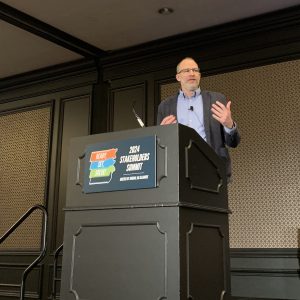2024 Stakeholders Summit addresses engaging allies, ballot initiatives, and legislative trends
Recording pass available through May 24; Save the date for April 30-May 2, 2025
May 13, 2024 – Key themes addressed at the Animal Agriculture Alliance’s 2024 Stakeholders Summit last week included advancements in technology, animal welfare, antibiotic use, and transparency. Speakers also covered issues including legal and legislative trends and animal rights activism. A recording pass to view the Summit sessions is available through May 23 for those who were not able to attend in person. Purchase a recording pass here. The 2024 Summit, themed “Ready, Set, Solve! Advancing Animal Agriculture,” was held May 8-9 in Kansas City, Mo. and attracted more than 260 in-person attendees.
 The 2024 Summit included an impressive lineup of speakers from across the food supply chain and was “teed off” Wednesday morning by Joel Leftwich, chief strategy officer at Kansas Farm Bureau and president of the U.S. Agriculture Partnership Fund. Leftwich discussed the importance of identifying allies not directly involved in agriculture: “We have to have more than just the farm vote if we want to win elections.”
The 2024 Summit included an impressive lineup of speakers from across the food supply chain and was “teed off” Wednesday morning by Joel Leftwich, chief strategy officer at Kansas Farm Bureau and president of the U.S. Agriculture Partnership Fund. Leftwich discussed the importance of identifying allies not directly involved in agriculture: “We have to have more than just the farm vote if we want to win elections.”
Leftwich shared that the number of farms and farmers in the U.S. continues to decrease, however, the general public is increasingly interested in issues such as food affordability and availability. According to The Harris Poll, about 90% of Americans are concerned about food prices, which have skyrocketed due to animal rights-led ballot initiatives like California Proposition 12. “We know that folks who are now concerned about the price of food, they’re paying more attention to food policy…and now they’re starting to see the impacts of some of these ballot initiatives,” said Leftwich. “We have folks out there, more people who didn’t grow up on farms, more people from those highly populated states…who are paying more attention to the price, who are paying more attention to the availability of food…How can we work with them?”
Ballot initiatives and legal issues were also discussed on Thursday morning in a panel featuring Brianna Schroeder, partner at Janzen Schroeder Agricultural Law LLC, Chelsea Good, vice president of government, industry affairs, and legal at Livestock Marketing Association, and Rick Stott, president and CEO at Superior Farms. Panelists discussed ongoing litigation related to right to farm laws, impacts of Proposition 12, and a Denver initiative banning processing plants in the city set for a vote on the November ballot.
Speakers agreed that ballot initiatives like Proposition 12 and the Denver initiative set a dangerous precedent for passing similar legislation in other places. “It’s a slippery slope,” said Good. Schroeder expects this trend to continue, stating, “It’s hard to get something to pass on a national level…so I think we’re going to see more state, county, municipality rules and regulations get passed.”
Many of these ballot campaigns impacting animal agriculture are initiated and spear-headed by animal rights extremist groups. In Denver, Superior Farms is the only facility that will be impacted, but if passed, the initiative will set a precedent that can be replicated elsewhere. Superior Farms, which has been operating in Denver for nearly 80 years, employs roughly 160 people. According to an impassioned Stott, the animal rights extremist groups behind the ballot initiative are seeking to place animals ahead of people. “They’re willing to sacrifice jobs, people’s families, retirements. They don’t care what happens to people,” said Stott. He concluded that if initiatives like this can happen in Denver, a town built on agriculture, it can happen anywhere.
 When it comes to issues in agriculture, consumer engagement continues to play a vital role in shifting public perceptions by increasing awareness and understanding. Similar to Leftwich, Wendy Reinhardt Kapsak, president and CEO of the International Food Information Council, agreed that agriculture needs to find allies to speak on its behalf that can also meet consumers in new and creative ways. Dietitians and health professionals are key influencers when it comes to conversations around food and nutrition – although all voices are needed. She argued, “If you choose to remove yourself from situations that make you uncomfortable, you will have your story told for you.”
When it comes to issues in agriculture, consumer engagement continues to play a vital role in shifting public perceptions by increasing awareness and understanding. Similar to Leftwich, Wendy Reinhardt Kapsak, president and CEO of the International Food Information Council, agreed that agriculture needs to find allies to speak on its behalf that can also meet consumers in new and creative ways. Dietitians and health professionals are key influencers when it comes to conversations around food and nutrition – although all voices are needed. She argued, “If you choose to remove yourself from situations that make you uncomfortable, you will have your story told for you.”
Other sessions covered topics such as advancements in technology and animal welfare, responsible antibiotic use, building transparency in the supply chain, and distinguishing between animal rights and animal welfare. A recording pass is available for purchase through May 23. Buy a recording pass here.
Save the date for the 2025 Summit, set for April 30-May 2 in Arlington, Va. Follow the hashtag #AAA25 for periodic updates about the event. For general questions about Summit, please contact su****@**************ce.org or call (703) 562-5160.
The 2024 Summit would not have been possible without the support of our sponsors: Farm Journal, Meatingplace, Successful Farming, U.S. Poultry & Egg Association, Watt Global Media, Cargill, Zoetis, American Feed Industry Association, broadhead. + Filament, Merck, United Soybean Board, CoBank, Dairy MAX, Farm Credit Council, National Pork Producers Council, Pet Advocacy Network, Rabobank, Smithfield Foods, The Partnership, United Egg Producers, AdFarm, Agri-Pulse, American Farm Bureau Federation, American Veal Association, Cal-Maine Foods, Cobb, Edge Dairy Farmer Cooperative, Kemin, National Cattlemen’s Beef Association, National Chicken Council, National Pork Board, Phileo Lesaffre Animal Care, Progressive Dairy, Protect the Harvest, Eocene Environmental Group, Trans Ova Genetics, Vivayic, Eggland’s Best, and North Carolina Farm Bureau.
Category: Press Releases
Tag: Stakeholders Summit,
